2023 Recipients
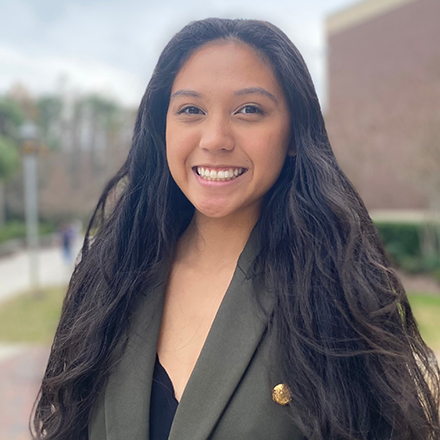
Dana Yaptangco
Read Bio
Dana Yaptangco
Unveiling Megastructures with Machine Learning
Dana, a student at the University of Florida, conducted her internship at the University of California, Berkeley. Advised by Dr. Ann Marie Cody and Dr. Daniel Giles, Dana developed a machine learning-enabled pipeline to detect anomalous patterns that could indicate the presence of megastructures around stars. Her findings have unveiled the detectability of megastructures in various shapes, providing valuable insights for ongoing research.
"I am truly honored to be recognized for my work in SETI," said Dana. "This scholarship provides an incredible opportunity to connect with inspiring researchers around the world. I am grateful to be part of this wonderful community dedicated to exploring humanity's intrinsic questions."
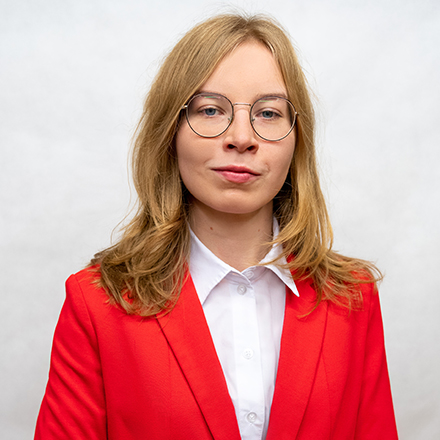
Róża Okoń
Read Bio
Róża Okoń
Decrypting the Secrets of Adenosine Isomers
Róża, a graduate of the University of Warsaw, Poland, currently pursuing her master's at the University of Barcelona, delved into the photochemical differences between two isomers of adenosine during her project at Harvard University and Wrocław University of Science and Technology. Awarded the 'Gold Medal of Chemistry' in Poland, Róża demonstrated the higher photostability of the biological isomer, shedding light on the potential role of UV light in molecular evolution on early Earth.
"Working on this project was fascinating, not only in terms of discovering the unknown but also due to the opportunity to meet people of science from around the world," says Róża. "Every opportunity to meet people from the field opens a new door for a young researcher and eventually creates a unique set of experiences that build us as future scientists."
2022 Recipients
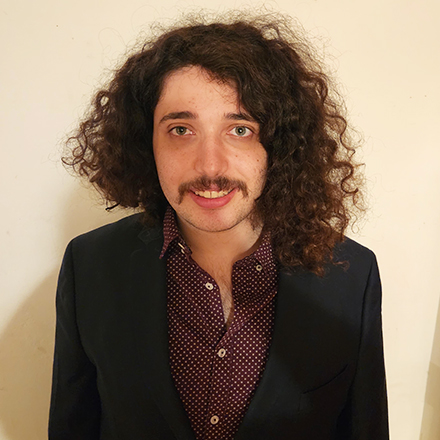
Benjamin Fields
Read Bio
Benjamin Fields
Benjamin attends Wheaton College and did his internship at Wheaton. His research focused on archival data Optical SETI. Specifically, he surveyed spectra taken by the European Southern Observatory’s (ESO) High Accuracy Radial velocity Planet Searcher (HARPS) spectrograph to see if it may have captured evidence of laser communications from extraterrestrial civilizations. Since HARPS is not primarily used to look for intelligently produced signals, there may be unnoticed technosignatures in the archived data. Ben wrote an algorithm that searched for anomalous energy spikes in the spectra of 2,821 stars that flagged candidate signals for follow-up investigation. He compared these strange energy spikes to natural stellar emission lines, signatures of the Earth's aurorae, and cosmic rays bombarding the CCD to ascertain whether they are natural or potentially extraterrestrial in origin. Ultimately my goal is to share it with the technosignature research community, and the SETI Forward Award gives me an excellent opportunity to do so!
“The search for extraterrestrial life is my greatest passion and has been for as long as I can remember,” said Fields. It remains one of the biggest fundamental questions we might answer with the tools of science, and one which I hope to dedicate myself to advancing. The SETI Forward Award represents an unparalleled opportunity to carve out this path, and I am honored to receive it.”
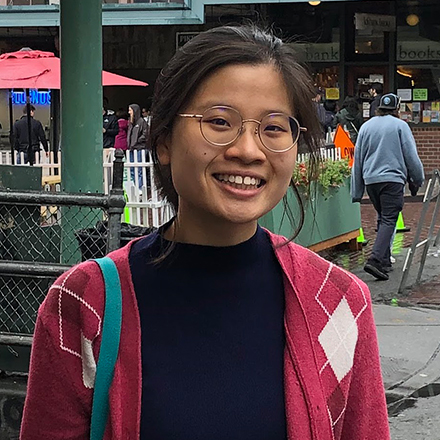
Ze-Wen Koh
Read Bio
Ze-Wen Koh
Ze-Wen attends Cornell University and did her internship at Cornell. The main idea driving her work is that Europa's seafloor topography could reveal information about the nature of Europa's geologic activity, which may manifest in the form of active volcanism or hydrothermal circulation at its seafloor. Ze-Wen created a suite of models to determine whether the topography of Europa's seafloor will be detectable from the upcoming Europa Clipper mission's gravity science experiments. She also modeled Europa's seafloor scaled from other geologically active bodies such as Earth, Venus and Io to determine how detectable volcanism and plate tectonics would be at Europa. The team found, in general, that the coarse style of Europa's seafloor topography is indeed detectable from a gravity science experiment of Clipper's resolution and published the results in their paper.
“Working on this project and receiving the SETI Forward award has affirmed that I'm working on valuable science in the search for life and that I have a place in this field,” said Koh. “I'm excited to contribute to a growing diversity of perspectives in astronomy and continue pursuing the question of dynamic habitability: how planetary surfaces, atmospheres and interiors evolve, and their resulting viability as hosts for life. After graduation, I hope to pursue a PhD in Planetary Science to further explore these research interests, followed by a career in academia or research.”
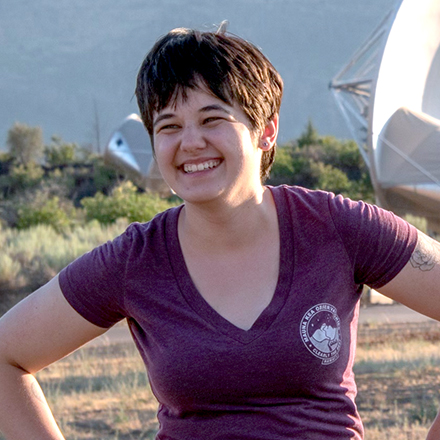
Lana Tilke
Read Bio
Lana Tilke
Lana attends Connecticut College and did her internship at the University of California, Berkeley. She was mentored by Dr. Steve Croft and the SETI Institute’s Dr. Ann Marie Cody. Her research involved conducting machine learning-enabled follow-up on TESS data to search for anomalies potentially indicative of technological megastructures.
“As a lifelong science fan, both factual and fictional, working in the field of SETI has been a goal of mine ever since I participated in Zooniverse’s Kepler Planet Hunters campaign as a child,” said Tilke. “I am honored for the support I have received from the SETI Institute and am eager to see where my career takes me, whether I become a research scientist, professor, science communicator, or all of the above!”
2021
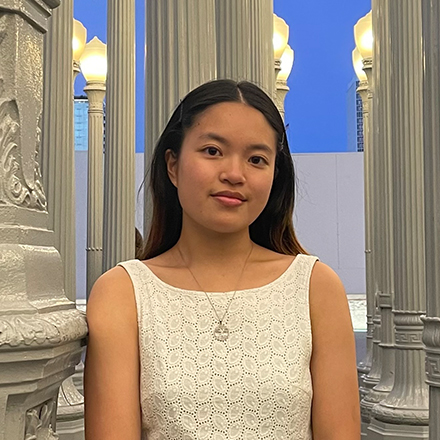
Yiwei Chai
Read Bio
Yiwei Chai
Area of study
Exoplanets, astrostatistics
How did SETI Forward help you advance your career?
The SETI Forward award provided me with the funding to present my SETI-related summer research project at AbSciCon 2022.
What have you done since you won the award?
I am currently completing a senior thesis on improving the radial velocity precision of APOGEE survey data using statistical techniques, with the aim of determining whether this is a viable method of detecting exoplanets. After graduation, I will be headed to Johns Hopkins University to pursue a PhD in Astronomy and Astrophysics, and hopefully focusing on more exoplanet research!
What advice do you have for undergraduates considering SETI/Astrobiology studies?
Go for it! Reach out to researchers doing the work you're interested in, and ask them for advice on what to learn and how to get involved. Ask people if they have research projects you can undertake. I came into college with zero coding/astronomy/hard sciences knowledge, so never hold yourself back because you don't feel qualified enough--you will learn a lot along the way! Also, apply to the Berkeley SETI Research Center summer REU (international students are eligible too)--it is an amazing experience!
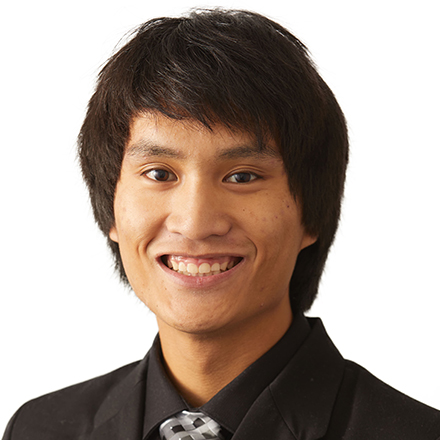
Raffy Traas
Read Bio
Raffy Traas
Area of study
Cosmology
How did SETI Forward help you advance your career?
The Berkeley/SETI Forward award will help me improve my science communication abilities by providing me support to attend scientific conferences. I am confident these experiences will be invaluable toward achieving future goals of being a science communicator in developing nations such as the Philippines - where I was born. Moreover, these skills are important for a future career in cosmology, so the Berkeley/SETI Forward award will also help advance my career preparation.
What have you done since you won the award?
Since receiving the award, I have continued working on GBT Breakthrough Listen projects as a part-time researcher during the school year. I am set to graduate this semester, but hope to continue working with the Berkeley SETI Research Center.
What advice do you have for undergraduates considering SETI/Astrobiology studies?
Working with SETI helped discover my passion for radio astronomy by introducing me to radio cosmology. If you're interested in SETI, then you might discover and find a passion for subfields within your own discipline that you hadn't considered previously.
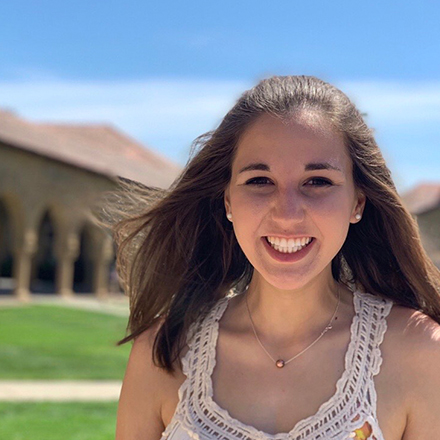
Zoe Weiss
Read Bio
Zoe Weiss
Area of study
RNA Evolution, Nucleic Acid Chemistry
How did SETI Forward help you advance your career?
The SETI Forward award has inspired me to continue research at the intersection of chemistry and astrobiology. In my future studies, I hope to continue answering the “how” questions of the various paths evolution has taken, from the astronomy of raw materials to the mechanism of their development, to such complex, diverse, and mysterious forms of life.
What have you done since you won the award?
I am an undergraduate at Harvard University and an undergraduate researcher in the Szostak Lab. My current project is investigating the evolutionary transition from RNA enzymes which function in prebiotic conditions (e.g., that can catalyze ligation of 2-aminoimidazole-activated RNA oligomers) to more modern enzymes (e.g., which use pyrophosphates). Collectively, my joint computational and experimental analyses reveal how RNA functions are interconnected in sequence space and illuminate viable paths toward the evolutionary diversification of RNA enzymes.
What advice do you have for undergraduates considering SETI/Astrobiology studies?
I encourage students with an interest in astrobiology to explore and consider their research and studies from a highly interdisciplinary perspective. I believe breakthroughs will be made as the result of integration of cutting edge research in both closely and distantly related domains. To understand how such complex and diverse forms of life emerged will require connections made at the intersection of astrobiology, chemistry, physics, and geology.
2020

Jakob Faber
Read Bio
Jakob Faber
Vishal Gajjar
Area of study
Radio Astronomy
How did the SETI Forward award help advance your studies and/or career?
The Berkeley/SETI Forward award has allowed me to attend a number of conferences (NRSM 2021, APS 2021) and present my research conducted with the BSRC at the 237th AAS conference (held virtually in January 2021). It will also allow me to present my current research with the CHIME/FRB collaboration at the upcoming IAU 2022 / FRB 2022 conference in Busan, South Korea.
What have you done since receiving the award?
Since receiving the award, I finished my final year at Oberlin College and accepted a Fulbright fellowship to work with the CHIME/FRB collaboration at McGill University. I also committed to the California Institute of Technology (Caltech) to pursue a Ph.D. in Astrophysics.
What advice do you have for undergraduates considering SETI/Astrobiology studies?
Do it! If your experience is anything like mine, you'll grow a lot as a scientist. And, I expect you'll experience a new sense of agency in doing science as you're encouraged to think creatively and move beyond standard methods.

Siddhant Sharma
Read Bio
Siddhant Sharma
Henderson Cleaves
Area of study
Nonequilibrium Processes for Chemical Origins of Life, Chemical Reaction Networks, Protocellular Self Assembly
How did the SETI Forward award help advance your studies and/or career?
The award opened up a lot of opportunities that were previously not available to me as an international student from India. It brought the required credibility for networking, academic collaboration, and making small strides as an early career researcher in the field, along with the financial backing to attend and present my work at a conference of my choice.
What have you done since receiving the award?
I will be graduating with my undergraduate degree in May 2022. Few notable opportunities arose after the award was a summer fellowship with Chalmers University of Technology, Sweden, and a collaboration with Dr Tomasz Zajkowski from Dr Lynn Rothschild’s group at NASA Ames, US. I was also awarded the 2022 Harvard Origins of Life Undergraduate Summer Research Prize to work with Dr Juan Perez Mercader at the Department of Earth and Planetary Sciences.
What advice do you have for undergraduates considering SETI/Astrobiology studies?
There will be times when you will not be eligible for programs, and there will be other forms of gatekeeping with respect to undergraduate research opportunities, and resources. The way to move forward is by being proactive, creating opportunities even if they don’t exist yet, having a wide network of people who believe in you and would love to see you succeed, and putting in the effort to craft your own unique experiences. Due to the interdisciplinary nature of the field, you will always find a use for your skills but at the same time, one has to make an effort to plan their future moves to explore and appreciate the mission of SETI research.

Ellie White
Read Bio
Ellie White
Steve Croft
Area of study
Radio astronomy, telescope instrumentation, SETI, citizen science, science communication and outreach
How did the SETI Forward award help advance your studies and/or career?
Receiving the SETI Forward award was a major highlight of my college years, and I believe that it ultimately helped me secure a job with the Green Bank Observatory. In addition to this more tangible outcome, receiving the award – and in particular, getting to participate in the Drake Awards ceremony alongside role models like Jill Tarter and amazing students like Karen Perez and Siddhant Sharma – made such a huge impact on me at a personal level; it was both humbling and extremely inspiring, and the memory is a touchstone that reminds me of just how lucky I am to get to contribute to SETI efforts, even in a small way, and to get to be a part of an amazing worldwide community of people involved in trying to answer big questions about life in the universe.
What have you done since receiving the award?
Since receiving the award, I graduated from Marshall University with a Bachelor of Science in Physics with a minor in Mathematics. I started work as a Scientific Data Analyst with the Green Bank Observatory in February and am working to support the world’s largest fully-steerable radio telescope. As part of my job I will also be assisting with the Breakthrough Listen project, which uses observing time on the Green Bank Telescope (GBT) to search for technosignatures, or signs of intelligent life in space!
What advice do you have for undergraduates considering SETI/Astrobiology studies?
Having caring, engaged mentors is the reason I am where I am today. If you are considering going into SETI or astrobiology, or any field really, it’s crucial to find people who will support you on your path and develop your skills and confidence so that when you get into the workforce or a graduate program, you will have a strong foundation to go back to when facing obstacles.
It’s very important to follow your own path and listen to your own inner voice – in some areas of academia, there can be a lot of external pressures to fit in a certain mold in order to succeed – but the most important thing is to figure out what you personally value and enjoy, and let yourself be steered by that, even if it is unorthodox and leads you down roads you wouldn’t expect. The road less traveled is often the most interesting!
2019

Karen Perez
Read Bio
Karen Perez
Vishal Gajjar
Area of study
Radio/X-ray Astronomy (transitional MSPs and pulsars in the Galactic Center)
How did the SETI Forward award help advance your studies and/or career?
The Berkeley/SETI Forward award has helped me connect with and share my research and ideas with pioneers in the field. It has propelled me to continue working in the field and encourage others to do the same, and I look forward to the exciting future of SETI in the years to come.
What have you done since receiving the award?
I am currently a Phd Grad Student in Astronomy at Columbia University. My thesis will be composed of two parts: 1) searching for transitional MSPs, and 2) searching for pulsars in the Galactic Center. The latter is a continuation of my work with Breakthrough Listen (BL) from my internship in 2019, and I’ll be continuing to work with my BL mentor Vishal Gajjar.
Besides this, I have also continued searching for technosignatures and am currently working on looking for intelligent life in the Galactic Plane and in the Galactic Center .
What advice do you have for undergraduates considering SETI/Astrobiology studies?
I would advise them to take as many relevant courses as possible (especially coding like Python), reach out to professors for undergrad research, and apply for summer internships. I suggest starting research as soon as possible, whether that is during the school year, or during the summer. It will help you gain hands-on experience, find your passion, and hone in on useful coding skills. Attending conferences and talks by experts in the field is also a very good way to learn, build academic relationships, and showcase your interest. Additionally, meeting 1-1 with someone who’s work you admire and asking how you can get there is invaluable.
2018

Mark Siebert
Read Bio
Mark Siebert
Astrochemistry, Radio/sub-mm Astronomy, Evolved Stars
How did the SETI Forward award help advance your studies and/or career?
What I learned at the Berkeley SETI Research Center formed the basis of my understanding on radio astronomy and observational data analysis. This was invaluable as I progressed in my career.
What have you done since receiving the award?
I am now a PhD student at the University of Virginia. My research now focuses on studying molecular chemistry in the outflows of evolved AGB stars.
What advice do you have for undergraduates considering SETI/Astrobiology studies?
Don't be afraid to ask questions! Many things in radio astronomy, astrobiology, and data analysis are hard to grasp at first, but all the scientists I know are eager to help with those kinds of things if you ask them.
